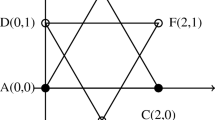Abstract
We approximate d-variate functions from weighted Korobov spaces with the error of approximation defined in the L ∞ sense. We study lattice algorithms and consider the worst-case setting in which the error is defined by its worst-case behavior over the unit ball of the space of functions. A lattice algorithm is specified by a generating (integer) vector. We propose three choices of such vectors, each corresponding to a different search criterion in the component-by-component construction. We present worst-case error bounds that go to zero polynomially with n −1, where n is the number of function values used by the lattice algorithm. Under some assumptions on the weights of the function space, the worst-case error bounds are also polynomial in d, in which case we have (polynomial) tractability, or even independent of d, in which case we have strong (polynomial) tractability. We discuss the exponents of n −1 and stress that we do not know if these exponents can be improved.
Similar content being viewed by others
Change history
21 January 2020
We correct the expression for the worst-case error derived in [Kuo, Wasilkowski, Wo��niakowski, Construct. Approx. 30 (2009), 475���493] and explain that the main theorem of the paper holds with enlarged constants.
References
Dick, J., Kritzer, P., Kuo, F.Y., Sloan, I.H.: Lattice-Nyström method for Fredholm integral equations of the second kind with convolution type kernels. J. Complex. 23, 752–772 (2007)
Hickernell, F.J., Woźniakowski, H.: Integration and approximation in arbitrary dimensions. Adv. Comput. Math. 12, 25–58 (2000)
Hickernell, F.J., Wasilkowski, G.W., Woźniakowski, H.: Tractability of linear multivariate problems in the average-case setting. In: Keller, A., Heinrich, S., Niederreiter, H. (eds.) Monte Carlo and Quasi-Monte Carlo Methods 2006, pp. 461–494. Springer, Berlin (2008)
Hinrichs, A., Novak, E., Vybiral, J.: Linear information versus function evaluations for L 2-approximation. J. Approx. Theory 153, 97–107 (2008)
Kuo, F.Y.: Component-by-component constructions achieve the optimal rate of convergence for multivariate integration in weighted Korobov and Sobolev spaces. J. Complex. 19, 301–320 (2003)
Kuo, F.Y., Sloan, I.H., Woźniakowski, H.: Lattice rules for multivariate approximation in the worst-case setting. In: Niederreiter, H., Talay, D. (eds.) Monte Carlo and Quasi-Monte Carlo Methods 2004, pp. 289–330. Springer, Berlin (2006)
Kuo, F.Y., Sloan, I.H., Woźniakowski, H.: Lattice rule algorithms for multivariate approximation in the average-case setting. J. Complex. 24, 283–323 (2008)
Kuo, F.Y., Wasilkowski, G.W., Woźniakowski, H.: Multivariate L ∞ approximation in the worst-case setting over reproducing kernel Hilbert spaces. J. Approx. Theory 152, 135–160 (2008)
Kuo, F.Y., Wasilkowski, G.W., Woźniakowski, H.: On the power of standard information for multivariate approximation in the worst-case setting. J. Approx. Theory 158, 97–125 (2009)
Li, D., Hickernell, F.J.: Trigonometric spectral collocation methods on lattices. In: Cheng, S.Y., Shu, C.-W., Tang, T. (eds.) Recent Advances in Scientific Computing and Partial Differential Equations. AMS Series in Contemporary Mathematics, vol. 330, pp. 121–132. American Mathematical Society, Providence (2003)
Novak, E., Sloan, I.H., Woźniakowski, H.: Tractability of approximation for weighted Korobov spaces on classical and quantum computers. Found. Comput. Math. 4, 121–156 (2004)
Nuyens, D., Cools, R.: Fast algorithms for component-by-component construction of rank-1 lattice rules in shift invariant reproducing kernel Hilbert spaces. Math. Comput. 75, 903–920 (2006)
Sloan, I.H., Kuo, F.Y., Joe, S.: Constructing randomly shifted lattice rules in weighted Sobolev spaces. SIAM J. Numer. Anal. 40, 1650–1665 (2002)
Wasilkowski, G.W., Woźniakowski, H.: Explicit cost bounds of algorithms for multivariate tensor product problems. J. Complex. 11, 1–56 (1995)
Wasilkowski, G.W., Woźniakowski, H.: Weighted tensor product algorithms for linear multivariate problems. J. Complex. 15, 402–447 (1999)
Wasilkowski, G.W., Woźniakowski, H.: On the power of standard information for weighted approximation. Found. Comput. Math. 1, 417–434 (2001)
Zeng, X.Y., Leung, K.T., Hickernell, F.J.: Error analysis of splines for periodic problems using lattice designs. In: Niederreiter, H., Talay, D. (eds.) Monte Carlo and Quasi-Monte Carlo Methods 2004, pp. 501–514. Springer, Berlin (2006)
Author information
Authors and Affiliations
Corresponding author
Additional information
Communicated by Ian Sloan.
Rights and permissions
About this article
Cite this article
Kuo, F.Y., Wasilkowski, G.W. & Woźniakowski, H. Lattice Algorithms for Multivariate L ∞ Approximation in the Worst-Case Setting. Constr Approx 30, 475–493 (2009). https://doi.org/10.1007/s00365-009-9075-x
Received:
Revised:
Accepted:
Published:
Issue Date:
DOI: https://doi.org/10.1007/s00365-009-9075-x
Keywords
- Multivariate approximation
- Lattice algorithm
- Worst-case error
- Average-case error
- L ∞ approximation
- L 2 approximation
- Tractability




